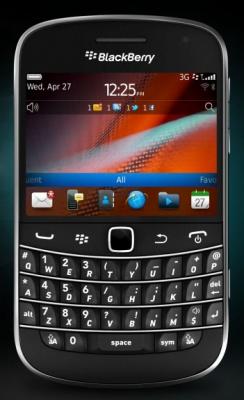RIM Announces First NFC-Enabled BlackBerrys

Research in Motion, as expected, has announced its first two NFC-enabled BlackBerrys, as it kicks off its BlackBerry World conference scheduled for this week in Orlando, Fla.
The new models, the BlackBerry Bold 9900 and Bold 9930, which are upgrades to RIM's Bold series, have NFC chips built in, supported by NFC software in RIM’s latest BlackBerry 7 operating system. The new models are due to be shipped to world markets starting this summer.
RIM in its announcement today noted that NFC would enable users to easily pair the smartphones with accessories, which would include headsets, and to read information, such as a Web link, by tapping the phones on NFC tags in smart posters.
There was no mention in the press material of using the handsets for NFC-based payment or ticketing. But the NFC chips RIM is using, which NFC Times has reported are supplied by France-based Inside Secure, likely are Inside's SecuRead product. This product combines the chip maker's MicroRead NFC controller with a secure element.
This stacked chip could support payment or other secure applications on this embedded secure element or on a separate NFC-enabled SIM card. RIM has said it would support the single-wire protocol and, therefore, SIM applications, in its NFC-enabled BlackBerrys. But the Canada-based smartphone maker is also known to be interested in using embedded secure chips for applications in its NFC devices.
Update: Among the possible uses by RIM of the chips would be to store employee credentials as part of enterprise security applications. Two other announcements by RIM Monday related to enhanced offers for corporations and government agencies, including a secure multiplatform device management system. RIM also probably wants its own trusted server management service. Research in Motion spokesperson was not available Monday for comment. End update.
The 9900 and 9930 are expected to be the first of several BlackBerrys supporting NFC from RIM, which has said that many, if not most, of its smartphones will support the technology.
RIM hopes NFC and other new features offered by the new Bold models–which the company touts as its thinnest BlackBerry smartphones ever–will help lift the company out of the doldrums.
RIM last week issued a profit warning, notifying investors of weaker than anticipated BlackBerry smartphone sales for the first quarter. The company, however, said it expects “strong revenue growth” in the third and fourth quarters driven by BlackBerry launches and cost savings.
Among the launches will be the NFC-enabled BlackBerry Bold smartphones announced today, which are expected to start shipping in the third quarter. The phones also will sport touch screens to go along with their BlackBerry keyboards, and 1.2 GHz processors
The new phones would compete this year with NFC-enabled smartphones based on the Android platform, as well as a few more expected Symbian smartphones from Nokia.
Samsung, maker of Google’s Nexus S Android phone that is already on the market, also plans to ship the sequel to its popular Galaxy S smartphone with NFC inside, the Galaxy S II.
Samsung will also come out with an NFC-enabled smartphone supporting its bada operating system, the Wave 578, along with a follow-up to its S5230 NFC phone, which will still be a 2G feature phone. Both new NFC models are expected by mid-2011.
At least one NFC-enabled Android model each from LG Electronics and HTC are expected during the second half of this year. Nokia also is likely to introduce at least a couple more NFC-enabled Symbian smartphones in coming months, in addition to its C7, which is to begin shipping with the NFC functionality enabled.












